A Russian court on Monday imposed a closed trial on Monday for the retrial of imprisoned opponent Alexei Navalny, a leading Kremlin critic already imprisoned and now facing 30 years in prison for “extremism”, a case emblematic of repression in the midst of conflict in Ukraine .
Since the start of the military campaign in Ukraine in February 2022, most major opponents who have not fled Russia have been imprisoned or prosecuted, in particular for having denounced the conflict.
Mr. Navalny is already serving a nine-year prison sentence for “fraud”, a sentence with political motivations according to him and his supporters. He now faces 30 years of imprisonment in this new trial where he is accused in particular of having created and financed an “extremist” organization.
The 47-year-old opponent, who narrowly survived a poisoning in 2020 of which he accuses the Kremlin, has been imprisoned since January 2021.
The trial opened in the very high security penal colony IK-6 in Melekhovo, 250 km east of Moscow, according to an AFP correspondent. Mr. Navalny was in the courtroom with his lawyers.
During this first hearing, the prosecutor asked to conduct the proceedings behind closed doors, citing security reasons and his desire to protect the identity of a prosecution witness.
As a result, “the court has decided to close the trial” to the public, court spokesman Vadim Polejayev told reporters.
This measure will reinforce the opacity around the trial of the main Russian opponent, while the contours of the accusation are already blurred, the defense of Mr. Navalny having had only 10 days to study the 196 volumes of the file.
“No shame, no conscience, no honor”, denounced the father of the imprisoned opponent, Anatoliï Navalny, leaving the court.
Alexei Navalny has made a name for himself in particular for his investigations into corruption within Vladimir Putin’s regime and by organizing large-scale demonstrations. His organization, the Anti-Corruption Foundation (FBK), was shut down in 2021 for “extremism”.
Mr. Navalny also says he is the subject of a “terrorism” case in a separate procedure, for which he risks life in prison, but few details are known at this stage.
“Although it is clear, judging by the thickness of the volumes, that I am a methodical and diligent criminal, it is impossible to understand precisely what I am accused of”, recently commented the opponent with irony.
He accuses the Kremlin of wanting to keep him in prison for life to make him pay for his critics who have not weakened despite his imprisonment: through his team, Mr. Navalny continues to publish regularly on social networks.
Again on Monday, as the trial opened, he said he was launching a “long, stubborn and exhausting” campaign from his cell to convince the Russians to oppose the offensive in Ukraine.
“We are going to wage an election campaign against the war. And against Putin,” he said in a statement posted on his website.
The Russian opponent continues to display a fighting spirit despite particularly difficult prison conditions, his supporters accusing the prison administration of persecuting him.
In a message published in early June, the opponent, who lost a lot of weight in prison, indicated that he had been sent for the 16th time to a disciplinary cell, where the detainees are in solitary confinement and in the most trying living conditions.
Like Mr. Navalny, most of the known opponents who had not gone into exile have been imprisoned in recent years, especially since the start of the conflict in Ukraine.
This is the case, for example, of Vladimir Kara-Mourza, sentenced in April to 25 years in prison for “high treason”, or even Ilia Iachine, sentenced in December to eight and a half years in prison for having criticized the offensive. in Ukraine.
On Monday, the attorney general’s office also added the human rights organization Agora to the list of organizations deemed “undesirable”, accusing it of representing a “threat to the security” of Russia.
On his 47th birthday in early June, Mr. Navalny claimed to be in good spirits.
A “better future” is only possible “if a certain number of people are ready to pay for the right to hold beliefs”, he declared.
19/06/2023 16:32:47 – Melekhovo (Russia) (AFP) – © 2023 AFP















